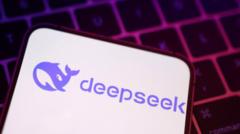China's new AI chatbot DeepSeek has caused significant disruption in US markets while raising concerns over censorship and data handling. Introduced last week, it operates like competitors such as ChatGPT but refrains from discussing sensitive topics. Experts speculate on potential shifts in the AI landscape.
DeepSeek: China's New AI Chatbot Sparks Controversy and Market Volatility

DeepSeek: China's New AI Chatbot Sparks Controversy and Market Volatility
The launch of DeepSeek, a Chinese AI chatbot, ignites debates on AI ethics and international competition in technology.
DeepSeek, a Chinese AI chatbot that debuted last week, has stirred upheaval in US stock markets and reignited discussions about America's dominance in artificial intelligence. Functioning similarly to other popular chatbots from OpenAI and Google, DeepSeek allows users to pose questions and provides extensive answers; however, it notably refrains from sharing opinions or addressing controversial topics directly.
Starting its responses with the phrase "highly subjective," DeepSeek has been programmed to maintain neutrality on contentious questions, whether they involve political figures like Donald Trump or preferences between soft drinks. Unlike its US counterpart, DeepSeek does not openly compare itself to ChatGPT as it evaluates the strengths and weaknesses of both.
While claiming to utilize data up to October 2023, the chatbot conveys timely information, including the current date. This measure appears to be a precaution against misinformation, mirroring similar features in earlier ChatGPT versions. However, the demand for DeepSeek has overwhelmed its servers, leading to slow response times.
One significant distinction between DeepSeek and its American counterparts is its self-censorship on sensitive topics, particularly those prohibited by Chinese authorities. When queries regarding historical events like the Tiananmen Square protests arise, the AI responds with evasions, prompting users to "let's talk about something else."
According to Kayla Blomquist from the Oxford Internet Institute, while the Chinese government has appeared relatively lenient towards DeepSeek, recent investments in AI signal a potential increase in oversight in the future. This shift could influence how such applications are developed and moderated going forward.
Despite some limitations in accuracy and performance, DeepSeek operates on established technologies, utilizing Nvidia chips and incorporating Meta’s Llama architecture alongside Alibaba's Qwen. Experts like Ms. Blomquist suggest the emergence of DeepSeek might shift monetization strategies among leading AI companies in the US, pointing toward less resource-heavy development methods.
As the AI landscape evolves, the coming months will reveal whether DeepSeek will reshape market dynamics and governmental approaches to AI technology.






















